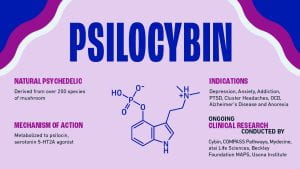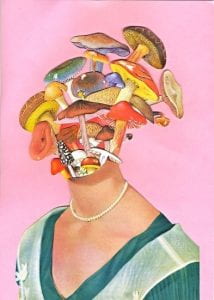Post-traumatic stress disorder (PTSD) is a type of disorder that develops due to the experience of a highly traumatic event. Anxiety, depression, intrusive thoughts and recollections of traumatic memories are among the symptoms experienced by those who have been diagnosed with PTSD [1]. This type of disorder has a profoundly detrimental impact on individuals’ lives, and there are three general approaches in curing PTSD.
- Psychotherapy: “Regular and personal interaction” that seeks to alter a patient’s “thought patterns” [2]. This type of treatment is overwhelming for patients because it is difficult for them to bring up and discuss their trauma with others, and this results in “high levels of treatment dropouts” as well as substance misuse as a way to distract themselves from their feelings [3].
- Antidepressant medication: Works to “counteract” the consequences of stress as a result of PTSD [2].
- Time: PTSD can go away on its own in some cases [2].
- Psychotherapy
- Antidepressant Medication
- PTSD
Although the two registered drugs for PTSD treatment have helped cure many patients, both scientists and patients wish to have more options. In recent years, the use of Psilocybin has been researched and investigated as a potential treatment of PTSD. Psilocybin is a drug that entails “rewiring the neural pathways of stored memory to establish new pathways disassociating the experience from the negative emotion connected to the trauma that is causing depression of PTSD” [4]. The dangers, advantages, and potential side effects of psilocybin use as PTSD treatment will be determined as research continues to progress. 
A lot of PTSD patients struggle with the cycle of trauma and feel stuck in pain that has no relief. The replaying of memories can leave the patient feeling constantly trapped in their own mind and frustrated at the lack of progress in therapy. There seems to be a lack of trust in current methods of therapy which is echoed by a study conducted on veterans who struggle with PTSD in which “all participants reported perceiving barriers when accessing treatment with many considering psilocybin out of desperation” [5]. Furthermore, there has been more evidence that the current methods of therapy are not as successful as one might think. “Antipsychotics and antidepressants, according to research, have little to no effect on people with chronic PTSD or have experienced multiple traumas. Additionally, while these treatments don’t cure PTSD, they cause harmful side effects which can lead to other problems such as substance abuse and suicide” [2]. Not only is the medication failing to provide a cure, but so is the psychotherapy. In a study conducted on 883 veterans, “between 60-72% of participants retained their diagnosis following therapy. This suggests that, although some veterans benefit from psychotherapy, it rarely provides a cure” [5]. For these reasons, alternative methods are needed in the search for an effective and long-lasting cure, such results may be at the hands of Psilocybin therapy.
For these reasons, alternative methods are needed in the search for an effective and long-lasting cure, such results may be at the hands of Psilocybin therapy.
 To begin, there are many benefits and risks to take into account when considering treating post-traumatic stress disorder with psilocybin therapy. Recent studies have found that this classic psychedelic can eliminate fear as well as promote neural plasticity [6]. This increase in neural plasticity is important when treating individuals with PTSD as it allows for increased neurogenesis which encourages the forgetting of the individual’s traumatic memory [7]. It has also been found that psilocybin will help lessen anxiety, one of the major symptoms of PTSD [2]. Another important detail is that individuals cannot develop a chemical addiction to psilocybin, and even psychological addictions to this drug are extremely unlikely [2].
To begin, there are many benefits and risks to take into account when considering treating post-traumatic stress disorder with psilocybin therapy. Recent studies have found that this classic psychedelic can eliminate fear as well as promote neural plasticity [6]. This increase in neural plasticity is important when treating individuals with PTSD as it allows for increased neurogenesis which encourages the forgetting of the individual’s traumatic memory [7]. It has also been found that psilocybin will help lessen anxiety, one of the major symptoms of PTSD [2]. Another important detail is that individuals cannot develop a chemical addiction to psilocybin, and even psychological addictions to this drug are extremely unlikely [2].
Although there are plenty of benefits supporting psilocybin therapy, it’s important to also take its risks into consideration. One of the major risks included in the use of psychedelics is the potential for an extremely mentally-scarring experience, otherwise referred to as a “bad trip”. These psychological reactions can cause the individual to become emotionally  disturbed and agitated as well as having disconcerting hallucinations amongst other effects [8]. There are certain factors that increase the probability of an individual undergoing these episodes, including taking higher doses of the drug, excessive stimulation, dehydration and the simultaneous use of alcohol [8]. Unfortunately, these experiences are not entirely uncommon amongst users of psilocybin and are extremely life-changing. An online survey found that out of the 1,993 people that have used psilocybin, 39% believed that their worst experience using this drug is one of the five most challenging events of their life [9]. Furthermore, although psychedelic drugs have not been found to cause any serious health concerns, certain physical effects of psychedelic drugs may impact your health. These effects include increased blood pressure, increased body temperature, loss of appetite, nausea, vomiting and muscular issues [2]. As a whole, this form of therapy presents many benefits to those suffering from post-traumatic stress disorder but is not necessarily without risk.
disturbed and agitated as well as having disconcerting hallucinations amongst other effects [8]. There are certain factors that increase the probability of an individual undergoing these episodes, including taking higher doses of the drug, excessive stimulation, dehydration and the simultaneous use of alcohol [8]. Unfortunately, these experiences are not entirely uncommon amongst users of psilocybin and are extremely life-changing. An online survey found that out of the 1,993 people that have used psilocybin, 39% believed that their worst experience using this drug is one of the five most challenging events of their life [9]. Furthermore, although psychedelic drugs have not been found to cause any serious health concerns, certain physical effects of psychedelic drugs may impact your health. These effects include increased blood pressure, increased body temperature, loss of appetite, nausea, vomiting and muscular issues [2]. As a whole, this form of therapy presents many benefits to those suffering from post-traumatic stress disorder but is not necessarily without risk.
Due to the failure and mistrust in current methods of treating PTSD, such as psychotherapy and antidepressants/ antipsychotics, patients struggling with the mental illness seek treatment and a cure elsewhere. They often resort to illegal substances for self-medication, which can progress into addiction and exacerbate their mental illness. Psilocybin therapy goes beyond treating PTSD; studies suggest it could cure and reverse it. Its promotion of neuroplasticity and increase for neurogenesis encourages forgetting traumatic memories. Additionally, psilocybin lessens anxiety and isn’t chemically addictive – a perfect alternative to illicit substances that can cause grave harm to the patient’s life and well-being. Much like their legal psychotropic counterparts, there are risks associated with psilocybin therapy; but its risks are minimal in comparison to its rewards. Although infamous for potentially causing a scarring ‘bad trip’, that probability can be decreased by spreading awareness about its proper use and ensuring patients use it in a monitored, guided and professional setting. Psilocybin gives PTSD patients an effective alternative and a potential solution to their illness in the face of old, arguably ineffective therapeutic practices that are no longer satisfactory in the eyes of many patients. Total word count: 988 words

Works Cited:
1. Bird, Catherine I. V., Nadav L. Modlin, and James J. H. Rucker. 2021. “Psilocybin and MDMA for the Treatment of Trauma-Related Psychopathology.” International Review of Psychiatry 33 (3): 229–49. https://doi.org/10.1080/09540261.2021.1919062.
2. NYU Langone Health. n.d. “Post-Traumatic Stress Disorder Treatment with Psychedelic Drugs.” NYU Langone Health. Accessed October 7, 2022.https://med.nyu.edu/departments-institutes/population-health/divisions-sections-rs/medical-ethics/education/high-school-bioethics-project/learning-scenarios/ptsd-treatment-psychedelics.
3. Sessa, Ben. 2017. “MDMA and PTSD Treatment: ‘PTSD: From Novel Pathophysiology to Innovative Therapeutics.’” Neuroscience Letters 649 (May): 176–80. https://doi.org/10.1016/j.neulet.2016.07.004.
4. Schwartz, James. 2022. “Psilocybin Therapy for PTSD and Depression.” Cannabis Science and Technology, Psychedelics: New Frontiers in Alternative Medicine,5(s1).https://www.cannabissciencetech.com/view/psilocybin-therapy-for-ptsd-and-depression.
5. Smith, FL, JC Neill, and V Wainwright. 2022. “An Interpretative Phenomenological Analysis of the Use of Psilocybin by Veterans with Symptoms of Trauma.” Drug Science, Policy and Law 8 (January): 20503245221124116. https://doi.org/10.1177/20503245221124117.
6. Ly, Calvin, Alexandra C. Greb, Lindsay P. Cameron, Jonathan M. Wong, Eden V. Barragan, Paige C. Wilson, Kyle F. Burbach, et al. 2018. “Psychedelics Promote Structural and Functional Neural Plasticity.” Cell Reports 23 (11): 3170–82. https://doi.org/10.1016/j.celrep.2018.05.022.
7. Ishikawa, Rie, Chiaki Uchida, Shiho Kitaoka, Tomoyuki Furuyashiki, and Satoshi Kida. 2019. “Improvement of PTSD-like Behavior by the Forgetting Effect of Hippocampal Neurogenesis Enhancer Memantine in a Social Defeat Stress Paradigm.” Molecular Brain 12 (1): 68. https://doi.org/10.1186/s13041-019-0488-6.
8. Alston, Rob. 2022. “What Is a Bad Trip? | Common Symptoms of Bad Trips | How to Stop a Bad Trip.” The Recovery Village Drug and Alcohol Rehab. 2022. https://www.therecoveryvillage.com/teen-addiction/what-is-a-bad-trip/.
9. Carbonaro, Theresa M, Matthew P Bradstreet, Frederick S Barrett, Katherine A MacLean, Robert Jesse, Matthew W Johnson, and Roland R Griffiths. 2016. “Survey Study of Challenging Experiences after Ingesting Psilocybin Mushrooms: Acute and Enduring Positive and Negative Consequences.” Journal of Psychopharmacology 30 (12): 1268–78. https://doi.org/10.1177/0269881116662634.








Leave a Reply